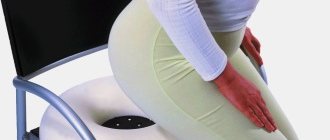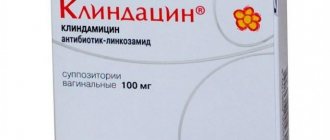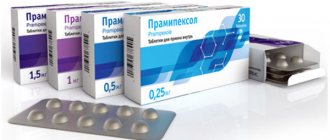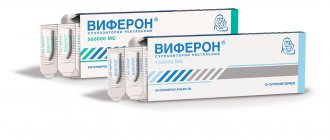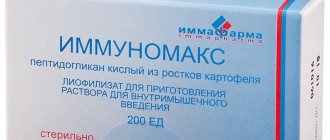Published 03/02/2019 · Comments: · Reading time: 6 min · Views: Post Views: 15,988
According to statistics, every third adult in Russia suffers from the problem of stool retention. Constipation is also common among children. Malaise occurs for many reasons, the elimination of which may take time. At the same time, I want to solve the problem quickly and delicately. “Bisacodyl” suppositories are one of the most well-known drugs for eliminating situational constipation. The product is effective and inexpensive.
Bisacodyl: composition and release form
This drug belongs to the group of laxatives and carminatives that help fight constipation. Improvement in peristalsis occurs due to the main active ingredient - bisacodyl, which is a derivative of diphenylamine, the amount of which depends on the form in which the medicine is released.
In pharmacies, Bisacodyl is sold in the form of tablets, dragees and rectal suppositories. Light gray suppositories contain 10 mg of synthetic active ingredient. Blisters contain 6 or 10 candles, and this number depends on the manufacturer. In general, patients prefer to use this form of the drug.
Composition of the drug
The basic component of the drug is bisacodyl. One suppository contains about 10 mg of this substance. Additionally, the suppositories contain semi-synthetic glycerides.
Bisacodyl suppositories are white. A yellowish tint may be present. The shape of the candles is torpedo-shaped. The surface is smooth and oily in texture. Bisacodyl suppositories are sold in contour cells. One package includes from 5 to 10 suppositories.
pharmachologic effect
The therapeutic effect of suppositories is manifested in the distal intestine . How does the drug work? The active substance of the drug begins to irritate the nerve endings of the intestinal mucosa, due to which there is an increase in the movement of the intestinal walls, which push food from the upper parts of the digestive tract to the lower parts. In addition, the passage of food masses is accelerated. Fluid absorption is not complete, resulting in looser stools.
The active substance helps block the process of absorption of liquid and salts from the intestinal lumen. Such effects help soften stool during constipation, which can be caused by various disorders of the digestive system.
Application Features
Like other laxatives, Bisacodyl should not be used continuously for more than 5 days without determining the cause of constipation. Prolonged and excessive use of the drug may cause electrolyte and fluid imbalances, as well as hypokalemia. Loss of fluid during bowel movements can lead to dehydration, which may be accompanied by symptoms such as thirst and oliguria. Dehydration can harm the body (for example, in case of kidney failure, in elderly people), therefore, if the above symptoms occur, the use of the drug must be stopped and can only be resumed under the supervision of a doctor. Long-term use can lead to the formation of addiction, when the act of defecation will be possible only after using a laxative.
Frequent use of Bisacodyl in elderly patients can increase asthenia, cause orthostatic hypotension and impaired coordination of movements associated with loss of electrolytes. The drug may reduce serum potassium levels.
Dizziness and syncope may occur during bowel movements, and defecatory syncope and vascular reaction may occur with abdominal pain, which may be associated with constipation, which requires the use of a laxative.
There have been isolated reports of abdominal pain and bloody diarrhea observed with Bisacodyl, which may be related to ischemia of the intestinal mucosa.
Suppositories are not recommended for use in patients with anal fissures, proctitis and ulcerative hemorrhoids, as this can lead to pain and local irritation. Do not use in patients with obstructive bowel disease or acute conditions such as appendicitis, or in patients with inflammatory bowel disease.
Stimulant laxatives, including Bisacodyl, do not promote weight loss.
Use during pregnancy or breastfeeding.
Bisacodyl is not recommended for use during pregnancy, especially in the first trimester, unless the expected benefit to the mother exceeds the potential risk to the fetus, and only as prescribed by a doctor. There have not been a sufficient number of controlled clinical studies in pregnant women.
Bisacodyl is not recommended for use during breastfeeding, unless the expected benefit to the mother outweighs the potential risk to the fetus, and only as directed by a doctor. It is unknown whether bisacodyl is excreted into breast milk.
The ability to influence the reaction rate when driving vehicles or other mechanisms.
The drug does not affect the reaction rate when driving vehicles or operating other mechanisms.
Indications for use
According to the instructions for use, Bisacodyl suppositories are indicated for constipation - severe hardening of the stool, which is accompanied by the impossibility of defecation. The development of constipation occurs as a result of pathological processes occurring in the digestive system. These include:
- Intestinal hypotension, which is characterized by a decrease in the tone of the smooth muscle fibers of the organ walls. This leads to a decrease in the intensity of peristalsis and stagnation of feces in the lower sections with their further compaction. The development of intestinal hypotension is facilitated by infectious diseases, age-related changes in the body of older people, as well as disturbances in the innervation of this organ by fibers of the autonomic nervous system. Quite often, this pathology develops in people who are forced to stay in bed for a long time, for example, in patients after major operations.
- The need to loosen stools if there are hemorrhoids.
- Functional constipation, which develops due to poor diet.
In addition, Bisacodyl suppositories are often used to loosen stools to cleanse the intestines before endoscopic examination , intestinal X-ray, or ultrasound examination.
How long does it take for Bisacodyl suppositories to work?
The action of the drug is based on reflex stimulation of receptors in the intestinal mucosa. By irritating the receptors, the components of the drug activate natural muscle contractions - peristalsis.
Additionally, the production of mucous secretion in the colon increases. Feces soften and lubricate. Together, this leads to natural bowel movement. This effect develops very quickly - in the first 10 - 15 minutes after administration of the suppository. The action is allowed to develop within an hour.
If defecation does not occur, it is better to consult a doctor.
Contraindications
According to the instructions for the drug Bisacodyl, the following physiological and pathological conditions of the body are contraindications to the use of suppositories:
- mechanical intestinal obstruction - in this case, stimulation of peristalsis with suppositories can provoke the development of various complications;
- acute proctitis, which is inflammation in the rectum;
- impaired digestion and absorption of lactose or glucose;
- acute inflammation of hemorrhoids, accompanied by the risk of bleeding from them;
- spastic constipation - in this case, the movement of food masses is disrupted due to narrowing of the intestines, which occurred as a result of too strong an increase in the tone of the smooth muscles of its walls;
- bleeding from any part of the gastrointestinal tract - in this case, Bisacodyl suppositories can increase the intensity of bleeding;
- inflammatory diseases of the abdominal organs, occurring in acute form;
- peritonitis is an acute inflammation of the peritoneum, covering the walls and loops of the abdominal cavity;
- strangulated hernia, a loop of intestine in which is located in the hernial sac;
- lactose enzyme deficiency;
- children under three years of age - Bisacodyl suppositories can cause rapid dehydration of the child’s body;
- intolerance to the components of the drug.
Interaction
Combination with antacid drugs, Ranitidine , Cimetidine , Omeprazole reduces the laxative effect and provokes irritation of the gastric mucosa, which is accompanied by severe pain .
Opiates , cholestyramine , psychotropic and anticholinergic drugs also reduce the effect of the drug.
A long course of Bisacodyl together with cardiac glycosides enhances the effect of the latter.
Carbenoxolone , Hydrochlorothiazide , Prednisolone , Methylprednisolone , Furosemide , Hydrocortisone and Dexamethasone in combination with Bisacodyl increase potassium loss in the body. Accordingly, a deficiency of this microelement may develop.
Directions for use and dosage
Bisacodyl suppositories are administered rectally once a day . This must be done in the morning, because the development of the laxative effect occurs after 1 - 2 hours.
The dosage of the drug depends on age:
- from 3 to 7 years – ½ suppository (5 mg);
- from 7 to 14 years – 1 suppository (10 mg);
- from 14 years and older – 1 – 2 suppositories (10 – 20 mg).
No more than two suppositories can be administered per day . First, one suppository is administered, and if it does not help get rid of constipation, then the dosage is doubled. How to use the drug correctly? The suppository is removed from the package and inserted into the rectum as deeply as possible. If Bisacodyl is used to empty the intestines before diagnosis or surgery, then the evening before the procedure, take 2-4 tablets, and the next morning a suppository is administered. As a result, the maximum required effect is ensured.
When using suppositories, it is necessary to observe the frequency and dosage of taking the product. They should not be taken for more than seven days.
Reviews
Due to its effective action and low cost, the drug has become very popular in the pharmaceutical market. It is used by a huge number of people, so there are many real-life reviews about the advantages and disadvantages of taking Bisacodyl.
Patients note the speed and convenience of the onset of the effect as a big advantage. To get a morning bowel movement, you just need to take a pill at night.
The effect of the suppositories comes much faster and helps in case of urgent need to cleanse the intestines. One of the disadvantages that people note in their reviews is the weakening of the effect over time with long-term use.
Elderly people who have been taking the drug for several years have noted that sometimes the usual dose of Bisacodyl is not enough for them and they have to increase it. You can read real reviews about the medicine at the end of this article.
The main factors in the prevention of constipation are proper nutrition, plenty of fluids to drink, and an active lifestyle. In old age, constipation is associated more with age-related weakness of the intestines and muscles involved in the process of bowel movement.
Video on the topic: Constipation in a newborn. Causes, treatment.
Side effects and overdose
According to the instructions for use, the use of Bisacodyl suppositories may cause side effects. From the digestive system, abdominal pain, bloating, nausea, and vomiting are possible. Sometimes there is an admixture of mucus and blood in the stool. In rare cases, an allergic reaction develops, which manifests itself in the form of hives, itching, and skin rash. If suppositories are used for a long time, dehydration and mineral deficiency may develop. The occurrence of side effects entails stopping taking the suppositories and seeking medical help.
It is not recommended to overdose when using Bisacodyl suppositories. If the recommended dose of the drug is exceeded, severe diarrhea, dehydration and loss of salts may develop. Use of suppositories for more than 7 days causes hypokalemia, dehydration and damage to the renal tubules. In case of overdose, rehydration therapy is carried out - restoration of salts and fluids in the body using intravenous drips of saline solutions.
Side effects
A laxative can cause negative reactions such as:
- Gas formation.
- Pain in the epigastrium.
- Feeling nauseous.
- Possible vomiting.
- Diarrhea, including the profuse type, which leads to dehydration.
- Lack of intestinal motility.
- Allergic manifestations in the form of swelling, itching, development of urticaria symptoms.
- Local irritation in the anus when taking suppositories.
Bisacodyl during pregnancy
difficulty having bowel movements during pregnancy . Constipation occurs as a result of hormonal changes in the body that occur at the very beginning of pregnancy and pressure on the intestines of the growing uterus. If left untreated, hemorrhoids may develop. But during pregnancy, almost all medications are prohibited for use, so the doctor selects a remedy that will not have a negative effect on the development of the fetus.
Bisacodyl suppositories can be used during pregnancy at any stage. The components of this laxative drug are practically not absorbed into the general bloodstream, making it completely safe for the expectant mother and baby.
Pregnant women are allowed to use 10 mg of the drug per day, but long-term effects from the suppositories should not be expected. They get rid of the problem once, but do not eliminate the cause of constipation. A pregnant woman must follow a diet to get rid of difficulties with bowel movements. To do this, you need to eat foods that have a fixing effect, and you should also introduce plant fiber into your diet. You should consume more jelly, juices, and fermented milk products.
By following a diet during pregnancy, a woman will be able to empty her bowels more often, preventing hemorrhoids and constipation.
How does the laxative Bisacodyl work?
Bicasodil is a strong drug. The main pharmacological effect is laxative. It has a direct effect on the nerve receptors of the large intestine, helping to restore peristalsis and its natural release. The drug stimulates the synthesis of mucus, so emptying the body occurs easily.
Along with the normalization of intestinal motor function, Bicasodil accumulates fluid in it. Due to this, the feces soften and are excreted without problems.
After oral administration, the therapeutic effect of the laxative is observed after 6 hours. When using a suppository, the effect occurs after 30-60 minutes.
Price
The cost of Bisacodyl suppositories from different manufacturers is approximately the same, and the difference can only be a few rubles. These different costs are due to transportation, storage and the retail markup of the particular network. The average price of Bisacodyl suppositories is 40 rubles .
Thus, if such an unpleasant phenomenon as constipation occurs, it is recommended to use the drug Bisacodyl. This laxative, a photo of which is presented in the article, is produced in different forms, which begin to act at different times. The optimal form is suppositories, but when using them it is recommended to follow the instructions, since suppositories have contraindications and side effects.
Bisacodyl suppositories
The cost of the medicine and its analogues
The average price of a package of the product is 30-40 rubles. The drug has analogues. Similar in composition to the main product of the Dulcolax suppository. Suppositories contain the same substance bisacodyl. Additionally, they contain vitepsol. Dulcolax has the same effect; the drug has a similar list of indications along with contraindications. The cost of the analogue significantly exceeds the price of the main product: 6 Dulcolax suppositories cost about 220 rubles.
An analogue of the drug is Bisacodyl Altpharm. The drug is identical to the main one. The difference lies in the manufacturer and cost of the suppositories. The price of candles produced by Nizhpharm may be slightly less.
Bisacodyl suppositories are classified as laxatives. The instructions contain a complete list of what this remedy can be prescribed for. The main indication for the use of suppositories is constipation. At the same time, the medication has a wide list of contraindications. Before using it, consultation with a specialist is required.

